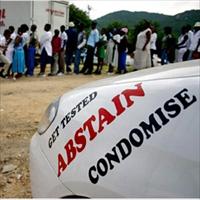ANGOLA: Fun and games in the fight against AIDS

Under the noonday sun in Angola's capital, Luanda, two soccer teams are preparing to play, but the heat does not seem to faze them or the 350 young people and children waiting for the game to begin.
The match was one of the activities in the Desposida programme, an initiative by local NGO Cuidados da Infância (Childhood Care in Portuguese), the UN Children's Fund (UNICEF) and the Angolan Ministry of Health, that uses sports to teach the concepts of camaraderie and non-violence and spread information on HIV and AIDS.
"We want young people to be more conscious of the risks of HIV, and we want to reduce violence and juvenile delinquency," said Arnaldo Camolacongue, executive director of Cuidados da Infância. The organization works to change risky sexual behaviour among young people and raise the awareness of mothers about infant and child health.
HIV prevalence rates in Angola are low compared to neighbouring countries in southern Africa, but so is awareness of how the disease is spread. Even teachers are largely uninformed.
Catching young people's attention
Desposida is a combination of the Portuguese words for 'sport' and 'AIDS'. With the help of local organizations, the programme will offer soccer, basketball and handball games, followed by hip-hop concerts and plays, and will take place every Saturday.
Educational materials on sexually transmitted infections, including HIV, and condoms will be distributed free of charge at tents set up around the sports grounds. The project is expected to run for two years.
A number of celebrities have already bought into the idea. Artists like singer Yannick Afroman, who is hugely popular among young Angolans, will participate in the events, interspersing music with information on HIV prevention and how to fight stigma and discrimination against HIV-positive people.
Children getting involved
The programme was launched in the municipality of Viana, on the outskirts of Luanda, and is expected to be up and running in the other eight municipalities in Luanda Province in the next seven months.
Camolacongue said some 450 young people were involved in implementing the campaign, organizing sporting activities and spreading information about HIV.
José da Silva, a UNICEF education specialist and head of the programme on HIV Learning and Prevention for Teenagers, anticipates reaching around 600,000 children and teenagers during the first year of the initiative.
"We also have to take this message - how HIV is and isn't transmitted - to the newer age groups; we feel that children or pre-teens have been left out and are generally not involved in initiatives."
The initiative also hopes to use children to take the message to their families and communities. "There's still a burden and a great deal of discrimination when you talk about HIV," said Silva, "so we have to find other ways of making information on the disease get to adults."
 Back and Next - Back and Next
Back and Next - Back and Next See Also - See Also
See Also - See Also